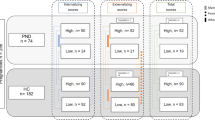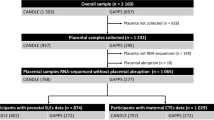Abstract
Prenatal maternal psychopathology affects child development, but some children seem more vulnerable than others. Genetic variance in hypothalamic–pituitary–adrenal axis genes may influence the effect of prenatal maternal psychological symptoms on child emotional and behavioral problems. This hypothesis was tested in the Generation R Study, a population-based cohort from fetal life onward. In total, 1727 children of Northern European descent and their mothers participated in this study and were genotyped for variants in the glucocorticoid receptor (GR) gene (rs6189/rs6190, rs10052957, rs41423247, rs6195, and rs6198) and the FK506-binding protein 5 (FKBP5) gene (rs1360780). Prenatal maternal psychological symptoms were assessed at 20 weeks pregnancy and child behavior was assessed by both parents at 3 years. In a subsample of 331 children, data about cortisol reactivity were available. Based on power calculations, only those genetic variants with sufficient minor allele frequencies (rs41423247, rs10052957, and rs1360780) were included in the interaction analyses. We found that variation in GR at rs41423247 moderates the effect of prenatal maternal psychological symptoms on child emotional and behavioral problems (beta 0.41, SE 0.16, p=0.009). This prenatal interaction effect was independent of mother's genotype and maternal postnatal psychopathology, and not found for prenatal psychological symptoms of the father. Moreover, the interaction between rs41423247 and prenatal psychological symptoms was also associated with decreased child cortisol reactivity (beta −2.30, p-value 0.05). These findings emphasize the potential effect of prenatal gene–environment interaction, and give insight in possible mechanisms accounting for children's individual vulnerability to develop emotional and behavioral problems.
Similar content being viewed by others
Log in or create a free account to read this content
Gain free access to this article, as well as selected content from this journal and more on nature.com
or
References
Achenbach TM, Rescorla LM (2000). Manual for the ASEBA Preschool Form & Profiles. University of Vermont, Research Center for Children, Youth & Families: Burlington, VT.
Ainsworth M, Blehar M, Waters E, Wall S (1978). Patterns of Attachment: A Psychological Study of the Strange Situation. Erlbaum: Hillsdale, NJ.
Bet PM, Penninx BW, Bochdanovits Z, Uitterlinden AG, Beekman AT, van Schoor NM et al (2009). Glucocorticoid receptor gene polymorphisms and childhood adversity are associated with depression: new evidence for a gene-environment interaction. Am J Med Genet B Neuropsychiatr Genet 150B: 660–669.
Beurs D (2004). Brief Symptom Inventory. Handleiding: Leiden, The Netherlands.
Binder EB (2009). The role of FKBP5, a co-chaperone of the glucocorticoid receptor in the pathogenesis and therapy of affective and anxiety disorders. Psychoneuroendocrinology 34 (Suppl 1): S186–S195.
Binder EB, Bradley RG, Liu W, Epstein MP, Deveau TC, Mercer KB et al (2008). Association of FKBP5 polymorphisms and childhood abuse with risk of posttraumatic stress disorder symptoms in adults. JAMA 299: 1291–1305.
Bouma EM, Riese H, Ormel J, Verhulst FC, Oldehinkel AJ (2011). Self-assessed parental depressive problems are associated with blunted cortisol responses to a social stress test in daughters. The TRAILS study. Psychoneuroendocrinology 36: 854–863.
Davis EP, Glynn LM, Schetter CD, Hobel C, Chicz-Demet A, Sandman CA (2007). Prenatal exposure to maternal depression and cortisol influences infant temperament. J Am Acad Child Adolesc Psychiatry 46: 737–746.
Davis EP, Glynn LM, Waffarn F, Sandman CA (2011). Prenatal maternal stress programs infant stress regulation. J Child Psychol Psychiatry 52: 119–129.
de Kloet ER, Joels M, Holsboer Fg (2005). Stress and the brain: from adaptation to disease. Nat Rev Neurosci 6: 463–475.
de Mutsert R, Jager KJ, Zoccali C, Dekker FW (2009). The effect of joint exposures: examining the presence of interaction. Kidney Int 75: 677–681.
Derijk RH (2009). Single nucleotide polymorphisms related to HPA axis reactivity. Neuroimmunomodulation 16: 340–352.
Derogatis LR (1993). Brief Symptom Inventory (BSI): Administration, Scoring and Procedures. Manual, 3rd edn. National Computer Systems: Minneapolis, MN.
Entringer S, Buss C, Wadhwa PD (2010). Prenatal stress and developmental programming of human health and disease risk: concepts and integration of empirical findings. Curr Opin Endocrinol Diabetes Obes 17: 507–516.
Gauderman WM JM (2006). Quanto 1.1: a computer program for power and sample size calculations for genetic-epidemiologic studies. http://hydra.usc.edu/gxe.
Geelhoed MJ, Steegers EA, Koper JW, van Rossum EF, Moll HA, Raat H . et al (2010). Glucocorticoid receptor gene polymorphisms do not affect growth in fetal and early postnatal life. The Generation R Study. BMC Med Genet 11: 39.
Glover V (2011). Annual Research Review: prenatal stress and the origins of psychopathology: an evolutionary perspective. J Child Psychol Psychiatry 52: 356–367.
Gunnar MR, Vazquez DM (2001). Low cortisol and a flattening of expected daytime rhythm: potential indices of risk in human development. Dev Psychopathol 13: 515–538.
Hertsgaard L, Gunnar M, Erickson MF, Nachmias M (1995). Adrenocortical responses to the strange situation in infants with disorganized/disoriented attachment relationships. Child Dev 66: 1100–1106.
Huizink AC, Mulder EJ, Buitelaar JK (2004). Prenatal stress and risk for psychopathology: specific effects or induction of general susceptibility? Psychol Bull 130: 115–142.
Ising M, Depping AM, Siebertz A, Lucae S, Unschuld PG, Kloiber S et al (2008). Polymorphisms in the FKBP5 gene region modulate recovery from psychosocial stress in healthy controls. Eur J Neurosci 28: 389–398.
Jaddoe VW, Bakker R, van Duijn CM, van der Heijden AJ, Lindemans J, Mackenbach JP et al (2007). The Generation R Study Biobank: a resource for epidemiological studies in children and their parents. Eur J Epidemiol 22: 917–923.
Jaddoe VW, van Duijn CM, van der Heijden AJ, Mackenbach JP, Moll HA, Steegers EA et al (2010). The Generation R Study: design and cohort update 2010. Eur J Epidemiol 25: 823–841.
Katz ER, Stowe ZN, Newport DJ, Kelley ME, Pace TW, Cubells JF et al (2012). Regulation of mRNA expression encoding chaperone and co-chaperone proteins of the glucocorticoid receptor in peripheral blood: association with depressive symptoms during pregnancy. Psychol Med 42: 943–956.
Krishnamurthy P, Romagni P, Torvik S, Gold PW, Charney DS, Detera-Wadleigh S et al (2008). Glucocorticoid receptor gene polymorphisms in premenopausal women with major depression. Horm Metab Res 40: 194–198.
Kumsta R, Entringer S, Koper JW, van Rossum EF, Hellhammer DH, Wust S (2007). Sex specific associations between common glucocorticoid receptor gene variants and hypothalamus-pituitary-adrenal axis responses to psychosocial stress. Biol Psychiatry 62: 863–869.
Lekman M, Laje G, Charney D, Rush AJ, Wilson AF, Sorant AJ et al (2008). The FKBP5-gene in depression and treatment response—an association study in the Sequenced Treatment Alternatives to Relieve Depression (STAR*D) Cohort. Biol Psychiatry 63: 1103–1110.
Liu D, Diorio J, Tannenbaum B, Caldji C, Francis D, Freedman A et al (1997). Maternal care, hippocampal glucocorticoid receptors, and hypothalamic-pituitary-adrenal responses to stress. Science 277: 1659–1662.
Luijk MP, Velders FP, Tharner A, van Ijzendoorn MH, Bakermans-Kranenburg MJ, Jaddoe VW et al (2010). FKBP5 and resistant attachment predict cortisol reactivity in infants: gene-environment interaction. Psychoneuroendocrinology 35: 1454–1461.
Lundy BL, Jones NA, Field T, Nearing G, Davalos M, Pietro PA et al (1999). Prenatal depression effects on neonates. Infant Behav Dev 22: 119–129.
Manenschijn L, van den Akker EL, Lamberts SW, van Rossum EF (2009). Clinical features associated with glucocorticoid receptor polymorphisms. An overview. Ann N Y Acad Sci 1179: 179–198.
Oberlander TF, Weinberg J, Papsdorf M, Grunau R, Misri S, Devlin AM (2008). Prenatal exposure to maternal depression, neonatal methylation of human glucocorticoid receptor gene (NR3C1) and infant cortisol stress responses. Epigenetics 3: 97–106.
Rautanen A, Eriksson JG, Kere J, Andersson S, Osmond C, Tienari P et al (2006). Associations of body size at birth with late-life cortisol concentrations and glucose tolerance are modified by haplotypes of the glucocorticoid receptor gene. J Clin Endocrinol Metab 91: 4544–4551.
Rutter M, Moffitt TE, Caspi A (2006). Gene-environment interplay and psychopathology: multiple varieties but real effects. J Child Psychol Psychiatry 47: 226–261.
Rutter M, Thapar A, Pickles A (2009). Gene-environment interactions: biologically valid pathway or artifact? Arch Gen Psychiatry 66: 1287–1289.
Seckl JR, Holmes MC (2007). Mechanisms of disease: glucocorticoids, their placental metabolism and fetal ‘programming’ of adult pathophysiology. Nat Clin Pract Endocrinol Metab 3: 479–488.
Sinclair D, Fullerton JM, Webster MJ, Shannon Weickert C (2012). Glucocorticoid receptor 1B and 1C mRNA transcript alterations in schizophrenia and bipolar disorder, and their possible regulation by GR gene variants. PLoS One 7: e31720.
Tollenaar MS, Beijers R, Jansen J, Riksen-Walraven JM, de Weerth C (2011). Maternal prenatal stress and cortisol reactivity to stressors in human infants. Stress 14: 53–65.
Uher R (2009). The role of genetic variation in the causation of mental illness: an evolution-informed framework. Mol Psychiatry 14: 1072–1082.
Uher R, McGuffin P (2008). The moderation by the serotonin transporter gene of environmental adversity in the aetiology of mental illness: review and methodological analysis. Mol Psychiatry 13: 131–146.
van Batenburg-Eddes T, de Groot L, Huizink AC, Steegers EAP, Hofman A, Jaddoe VWV et al (2009). Maternal symptoms of anxiety during pregnancy affect infant neuromotor development: the generation R study. Psychology Press 34: 476–493.
van den Berg MP, van der Ende J, Crijnen AA, Jaddoe VW, Moll HA, Mackenbach JP et al (2009). Paternal depressive symptoms during pregnancy are related to excessive infant crying. Pediatrics 124: e96–e103.
Van den Bergh BR, Mulder EJ, Mennes M, Glover V (2005). Antenatal maternal anxiety and stress and the neurobehavioural development of the fetus and child: links and possible mechanisms. A review. Neurosci Biobehav Rev 29: 237–258.
Velders FP, Dieleman G, Henrichs J, Jaddoe VW, Hofman A, Verhulst FC et al (2011). Prenatal and postnatal psychological symptoms of parents and family functioning: the impact on child emotional and behavioural problems. Eur Child Adolesc Psychiatry 20: 341–350.
Wadhwa PD, Dunkel-Schetter C, Chicz-DeMet A, Porto M, Sandman CA (1996). Prenatal psychosocial factors and the neuroendocrine axis in human pregnancy. Psychosom Med 58: 432–446.
Weaver IC, Cervoni N, Champagne FA, D’Alessio AC, Sharma S, Seckl JR et al (2004). Epigenetic programming by maternal behavior. Nat Neurosci 7: 847–854.
Weinstock M (2008). The long-term behavioural consequences of prenatal stress. Neurosci Biobehav Rev 32: 1073–1086.
Wilder J (1968). Stimulus and Response: The Law of Initial Values. Williams & Wilkins: Baltimore.
Zobel A, Schuhmacher A, Jessen F, Hofels S, von Widdern O, Metten M et al (2010). DNA sequence variants of the FKBP5 gene are associated with unipolar depression. Int J Neuropsychopharmacol 13: 649–660.
Zou YF, Wang F, Feng XL, Li WF, Tao JH, Pan FM et al (2010). Meta-analysis of FKBP5 gene polymorphisms association with treatment response in patients with mood disorders. Neurosci Lett 484: 56–61.
Acknowledgements
The Generation R Study is conducted by the Erasmus Medical Centre in close collaboration with the Erasmus University Rotterdam, School of Law and Faculty of Social Sciences, the Municipal Health Service Rotterdam area, Rotterdam, the Rotterdam Homecare Foundation, Rotterdam, and the Stichting Trombosedienst and Artsenlaboratorium Rijnmond (STAR), Rotterdam. We gratefully acknowledge all participants and the contribution of general practitioners, hospitals, midwives and pharmacies in Rotterdam. The first phase of the Generation R Study is made possible by financial support from: Erasmus Medical Centre, Rotterdam, Erasmus University Rotterdam and the Netherlands Organization for Health Research and Development (ZonMw). This study was supported by a grant from the Sophia Foundation for Scientific Research (SKZ Foundation) (Grant no.491) and ZonMw (Grant no.10.000.1003). MHvIJ and MJB-K were supported by research awards from the Netherlands Organization for Scientific Research (MHvIJ: NWO SPINOZA prize; MJBK: VICI Grant no. 453-09-003). HT was supported by NWO-grant 017.106.370 (VIDI).
Author information
Authors and Affiliations
Corresponding author
Ethics declarations
Competing interests
The authors declare no conflict of interest. Professor Dr FCV is a contributing author of the Achenbach System of Emperically Based Assessments, from which he receives remuneration.
Additional information
Supplementary Information accompanies the paper on the Neuropsychopharmacology website
Supplementary information
PowerPoint slides
Rights and permissions
About this article
Cite this article
Velders, F., Dieleman, G., Cents, R. et al. Variation in the Glucocorticoid Receptor Gene at rs41423247 Moderates the Effect of Prenatal Maternal Psychological Symptoms on Child Cortisol Reactivity and Behavior. Neuropsychopharmacol 37, 2541–2549 (2012). https://doi.org/10.1038/npp.2012.118
Received:
Revised:
Accepted:
Published:
Issue date:
DOI: https://doi.org/10.1038/npp.2012.118
Keywords
This article is cited by
-
Maternal early exposure to violence, psychopathology, and child adaptive functioning: pre- and postnatal programming
Pediatric Research (2022)
-
A 646C > G (rs41423247) polymorphism of the glucocorticoid receptor as a risk factor for hyperglycaemia diagnosed in pregnancy—data from an observational study
Acta Diabetologica (2022)
-
Associations of Chinese social face with cortisol level and glucocorticoid receptor gene
Current Psychology (2022)
-
Prenatal maternal antidepressants, anxiety, and depression and offspring DNA methylation: epigenome-wide associations at birth and persistence into early childhood
Clinical Epigenetics (2019)
-
Prenatal Maternal Distress: A Risk Factor for Child Anxiety?
Clinical Child and Family Psychology Review (2018)



